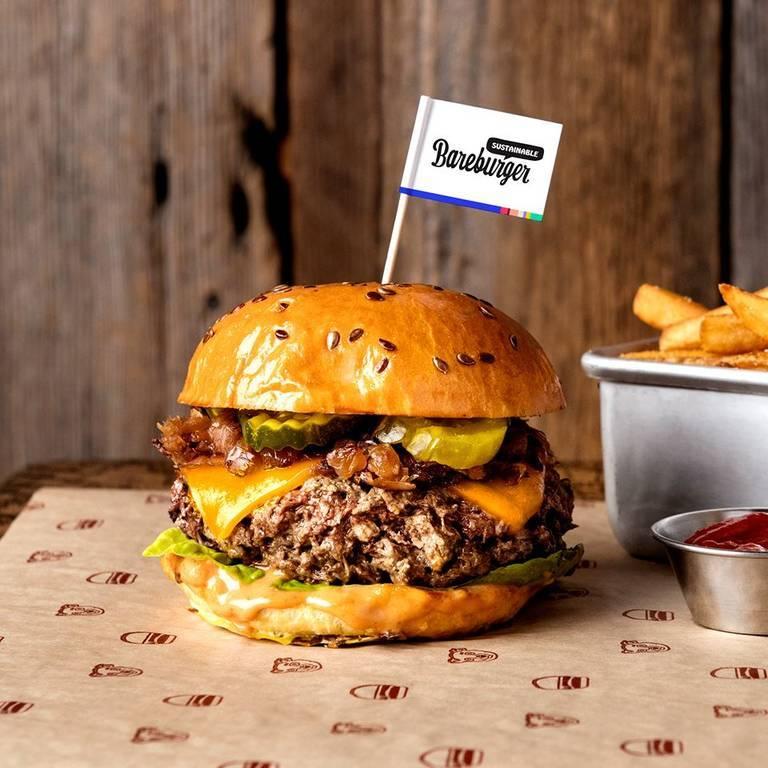
Hamburgers have roared in popularity over the past decade, and everyone has their favorite local joint or cult-like affinity for chains such as In-N-Out Burger and Shake Shack. But those cravings are also matched by an increasing concern over the meat industry’s impact, from those occasional foodborne illness outbreaks to deforestation.
Meanwhile, plant-based meat alternatives like Beyond Meat, Gardein and Yves are improving in taste and quality. Another fake meat company, Impossible Foods, hit the headlines in 2014 with its vegan 'bloody burger' made from coconut oil, wheat and potato protein. The burger appears red when raw and browns when cooked, just like the real thing. And it comes with a side of heme, a ferrous molecule that gives beef that meaty taste many of us crave.
Last year, the Impossible Burger made its debut at a Momofuku restaurant location in New York City. Since then, the burger made it onto menus at NYC’s Public and Saxon + Parole, as well as some high-end restaurants in California.
Last week, Impossible Foods scored a relationship with its first national burger chain at what is for now the small but popular eatery Bareburger. As Mic reported last week, the alternative burger will be offered not on a vegetarian menu, but alongside burgers made from elk, bison and beef.
So can this plant-based delicacy, which Mic’s Alex Orlov described as the “$80 million veggie burger [that] could help fight climate change,” sway meat lovers away from cows?
Impossible Foods’ founder, Stanford University biochemistry professor Pat Brown, says the company is on course to give meat-lovers a product that will eventually be as affordable as beef, but without wreaking havoc on the planet’s environment.
Many NGOs have long insisted that the global meat industry, especially the beef sector, is the world’s largest contributor to deforestation. In contrast, Impossible Foods claims its product requires 95 percent less land, consumes 74 percent less water and emits 87 percent fewer greenhouse gas emissions than beef burgers.
With a White House that is now dismissive of climate change risks and appears determined to dismantle the Environmental Protection Agency, the reality is that it will be up to the market to reduce emissions. As reported in publications including Forbes, Impossible Foods does not consider its competitors to be the likes of vegan food companies Quorn or Morningstar. Instead, Impossible Foods strives to be on the menu alongside meat options such as beef and lamb.
The trick is to offer more than a substitute for meat: To be successful, animal-free products have to taste just as good as the “real thing,” or even better. Beyond Meat, for example, strives to bring the price of its fake chicken strips -- made from ingredients including carrot fiber and pea flower -- down to the same as chicken breast meat, or even cheaper if possible.
The Impossible Burger is now on the menu at Bareburger's flagship restaurant near New York University. It will appear at other Manhattan locations this month and will eventually roll out at Barebugers nationwide, the company told Mic.
But Impossible Foods, which secured at least $108 million in its latest rounds of funding, will have to go beyond a few entrees at hip restaurants if plant-based protein alternatives will truly compete with the global meat industry.
If the company’s new space in Oakland, California, can help it scale and lead to a contract with a fast-food or more mainstream casual restaurant chain with a lower price point, then this industry can have a huge impact on consumers’ food choices.
Considering recent mounting evidence that the meat industry is causing, rather than preventing, more deforestation worldwide, the likes of Impossible Foods and Beyond Meat are on the cusp of huge breakthroughs, both environmentally and financially.
Image credit: Impossible Foods (press use only)

Leon Kaye has written for 3p since 2010 and become executive editor in 2018. His previous work includes writing for the Guardian as well as other online and print publications. In addition, he's worked in sales executive roles within technology and financial research companies, as well as for a public relations firm, for which he consulted with one of the globe’s leading sustainability initiatives. Currently living in Central California, he’s traveled to 70-plus countries and has lived and worked in South Korea, the United Arab Emirates and Uruguay.
Leon’s an alum of Fresno State, the University of Maryland, Baltimore County and the University of Southern California's Marshall Business School. He enjoys traveling abroad as well as exploring California’s Central Coast and the Sierra Nevadas.














